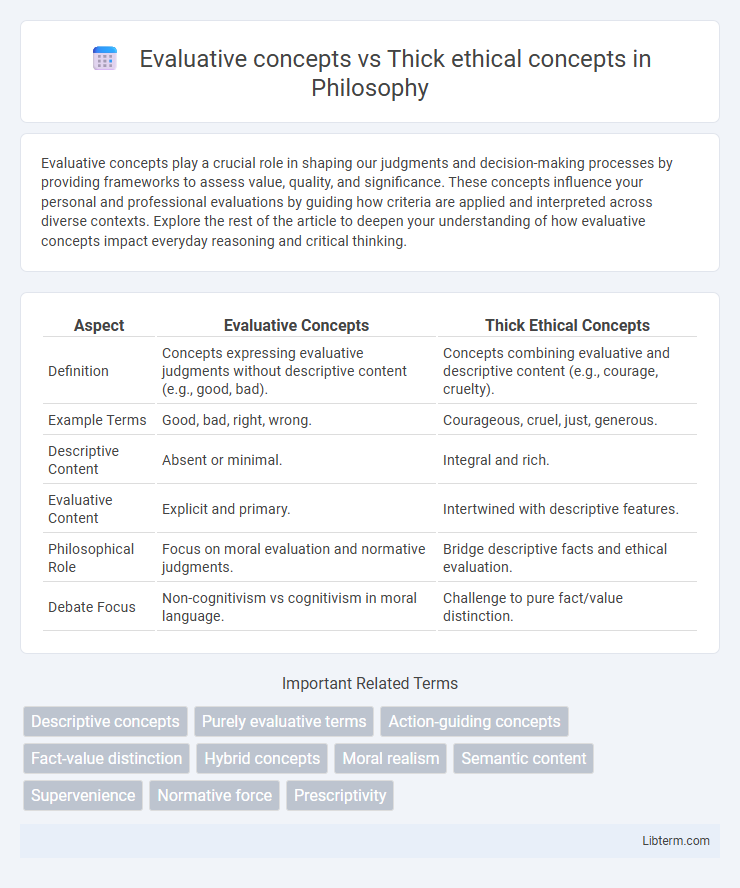Evaluative concepts play a crucial role in shaping our judgments and decision-making processes by providing frameworks to assess value, quality, and significance. These concepts influence your personal and professional evaluations by guiding how criteria are applied and interpreted across diverse contexts. Explore the rest of the article to deepen your understanding of how evaluative concepts impact everyday reasoning and critical thinking.
Table of Comparison
| Aspect | Evaluative Concepts | Thick Ethical Concepts |
|---|---|---|
| Definition | Concepts expressing evaluative judgments without descriptive content (e.g., good, bad). | Concepts combining evaluative and descriptive content (e.g., courage, cruelty). |
| Example Terms | Good, bad, right, wrong. | Courageous, cruel, just, generous. |
| Descriptive Content | Absent or minimal. | Integral and rich. |
| Evaluative Content | Explicit and primary. | Intertwined with descriptive features. |
| Philosophical Role | Focus on moral evaluation and normative judgments. | Bridge descriptive facts and ethical evaluation. |
| Debate Focus | Non-cognitivism vs cognitivism in moral language. | Challenge to pure fact/value distinction. |
Introduction to Evaluative and Thick Ethical Concepts
Evaluative concepts involve assessments that attribute value or worth, such as "good" or "bad," serving as foundational tools in moral reasoning. Thick ethical concepts combine descriptive elements with evaluative significance, exemplified by terms like "courageous" or "cruel," embedding moral judgment within factual content. Understanding the distinction between evaluative and thick ethical concepts is crucial for analyzing moral language and ethical theory.
Defining Evaluative Concepts
Evaluative concepts are terms that express approval or disapproval based on moral, aesthetic, or practical standards, such as "good," "bad," or "valuable," serving as fundamental tools for moral judgment. Unlike thick ethical concepts, which combine descriptive content with evaluative significance (e.g., "courageous," "cruel"), evaluative concepts primarily convey a judgment without detailed descriptive content. These concepts play a crucial role in ethical theory by enabling clear assessments of actions or qualities based on underlying value frameworks.
What Are Thick Ethical Concepts?
Thick ethical concepts combine descriptive and evaluative aspects, conveying both factual information and moral judgment within a single term. Examples include words like "cruel," "brave," or "generous," which describe specific behaviors while simultaneously expressing approval or disapproval. These concepts differ from purely evaluative terms, as they provide richer content by embedding ethical significance directly into the description of actions or traits.
Key Differences Between Evaluative and Thick Concepts
Evaluative concepts express purely moral judgments without descriptive content, such as "good" or "bad," focusing solely on ethical approval or disapproval. Thick ethical concepts combine both evaluative and descriptive elements, like "courageous" or "cruel," providing specific behavioral or character traits alongside moral evaluation. The key difference lies in thick concepts' ability to convey detailed information about actions or qualities while simultaneously carrying an ethical assessment, whereas evaluative concepts are strictly about moral valuation without descriptive detail.
Philosophical Background and Origins
Evaluative concepts, rooted in moral philosophy, express approval or disapproval without embedding descriptive content, tracing back to early 20th-century metaethics debates led by G.E. Moore and the non-cognitivist tradition. Thick ethical concepts combine evaluative and descriptive elements, originating from mid-20th-century analytic philosophy, notably from philosophers like Bernard Williams and Elizabeth Anscombe, who emphasized their indispensable role in ethical discourse. The distinction reflects foundational discussions on the nature of moral language and the complexity of ethical judgment within philosophical semantics.
Examples of Evaluative vs Thick Ethical Concepts
Evaluative concepts such as "good," "bad," "right," and "wrong" provide general assessments without detailed descriptive content, whereas thick ethical concepts like "courageous," "cruel," or "honest" combine evaluative judgment with rich descriptive features. For example, "wrong" is purely evaluative, expressing disapproval, while "cruel" implies both disapproval and a specific behavior causing suffering. Thick ethical concepts often carry cultural or contextual significance beyond simple approval or disapproval, blending moral evaluation with substantive information about actions or character traits.
Role in Moral Judgement and Reasoning
Evaluative concepts provide general assessments of actions, such as good or bad, and serve as foundational tools in moral judgment by guiding immediate evaluative responses. Thick ethical concepts, like honesty or cruelty, combine descriptive and evaluative elements, enriching moral reasoning by linking specific character traits or behaviors to broader ethical standards. Their dual nature helps individuals interpret complex situations and justify moral decisions with greater nuance and contextual understanding.
Debates Surrounding Moral Objectivity
Evaluative concepts, such as "good" or "bad," express value judgments without embedding descriptive content, while thick ethical concepts like "cruel" or "courageous" combine evaluative and descriptive aspects. Debates surrounding moral objectivity hinge on whether thick ethical concepts provide a more robust foundation for objective moral truths due to their empirical content. Philosophers argue that thick ethical concepts offer evaluative assessments grounded in factual human experiences, potentially supporting moral realism against relativism.
Implications for Ethical Theory and Practice
Evaluative concepts such as 'good' or 'wrong' provide general moral judgments, while thick ethical concepts like 'cruel' or 'just' combine descriptive and evaluative elements, embedding context-specific content. The integration of thick concepts into ethical theory enhances the precision of moral analysis by connecting abstract norms with concrete social practices. In ethical practice, acknowledging thick concepts fosters nuanced decision-making, allowing practitioners to navigate complex moral landscapes with greater sensitivity to cultural and situational factors.
Conclusion: Significance in Contemporary Ethics
Evaluative concepts, which express approval or disapproval without descriptive content, contrast with thick ethical concepts that combine evaluative and descriptive aspects, such as "cruel" or "just." Understanding this distinction is significant in contemporary ethics because it clarifies how moral language functions both in guiding actions and describing character traits. This insight aids ethical theorists in resolving debates about objectivity, moral motivation, and the integration of factual knowledge with moral evaluation.
Evaluative concepts Infographic

 libterm.com
libterm.com